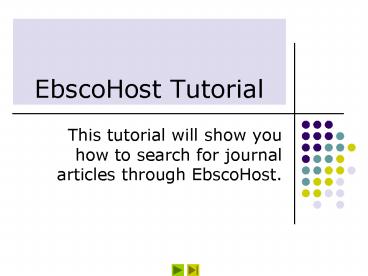EbscoHost Tutorial - PowerPoint PPT Presentation
1 / 29
Title:
EbscoHost Tutorial
Description:
On the UW-Richland library home page, click on Finding Journal Articles. ... Date Use this option to set a specific date range for the articles you wish to see. ... – PowerPoint PPT presentation
Number of Views:75
Avg rating:3.0/5.0
Title: EbscoHost Tutorial
1
EbscoHost Tutorial
- This tutorial will show you how to search for
journal articles through EbscoHost.
2
What is EbscoHost?
- EbscoHost is a tool that allows you to search a
single database or many databases at once. Each
database contains many electronic journals.
3
Where can I find EbscoHost?
- On the UW-Richland library home page, click on
Finding Journal Articles.
4
Then select the top link.
5
Select EbscoHost
6
The UW Colleges subscribe to over 30 databases
through EbscoHost. There is a brief description
for each.
7
Check the boxes of any databases you wish to
search, then hit Continue at the top or bottom
of the list.
8
Advanced Search will come up automatically.
You may put terms in one or more of the three
boxes on the left. Then select the type of
search for each.
9
Here you will find several options to narrow your
search. See the next slide to learn more about
these limiters.
10
Limiters
- Full TextThis means that all of the articles
brought up will be available in full text. You
will be able to view the articles in their
entirety, print them out, or e-mail the URL to
yourself and read the article at another
computer. - Published DateUse this option to set a specific
date range for the articles you wish to see. Use
this if you dont want anything older than five
years, for example. - Peer-Reviewed JournalsThese journals are
generally regarded as the most prestigious and
academically reliable. To be published in a
peer-reviewed journal, the article has been
thoroughly reviewed, and in many cases edited, by
a panel of leading scholars in the respective
field. - Click on the Help button in the upper-right hand
corner to find out more about limiters and many
other aspects of EbscoHost.
11
Well start with a single term search, entered as
Subject. We only want articles available in
full text.
12
This search gives us 270 results. Note the list
of additional subjects. Youll see more about
this later.
13
Now well add the term war as something that
could come up anywhere in the text of the
article.
14
This search gives us 129 resultsabout 140 fewer
than our previous search. Adding terms with the
connector and will narrow your search.
15
Now lets add a subject from the list provided.
16
This addition gives us 23 results.
17
Requesting an Article
- In our search we specified text only. Sometimes
this limiter will not produce enough results,
however.
18
Requesting an Article
- You may come across an article that is not
available in full text. If this happens, you
will have to request the article through ILLiad.
19
How do I know if the article is in full text?
- Lets compare two results in a search where Text
Only has not been selected
20
This article is available in full text.
This one may not be. Click on the Find It
button.
21
Clicking on Find It will bring up this screen.
This article is not available electronically in
any database available to the colleges.
Click on Advanced, then Request via ILLiad.
22
Enter your information and be sure to select
Richland Center.
23
This page provides the citation information of
the article you are requesting. Make sure it is
the article you want.
At the bottom of the screen hit Submit Request.
24
Visual Search
- Finally, well take a quick look at a new option
called Visual Search.
25
Visual Search
- When you select this tab at the top of the
screen, it will launch automatically into a
tutorial. The next slide is a still from the
tutorial.
26
As you can see, the graphics in this option are
quite different from Advanced Search.
The topic areas are in blue and the articles are
in green. Each time you select a subtopic, fewer
articles will be displayed, just like when we
added terms.
27
Just click on an article that interests you. It
will show up under Summary.
Click on More to see more information about the
article, including the full text, if its
available.
28
If the article isnt available in full text,
there will be a Find It button at the bottom of
the page. Use the inner scroll bar to scroll all
the way down.
29
Thank You
- Please dont hesitate to ask questions about
EbscoHost or any of the other databases at the
library.































![Using Zotero [zoh-TAIR-oh] PowerPoint PPT Presentation](https://s3.amazonaws.com/images.powershow.com/7356903.th0.jpg?_=20151109091)